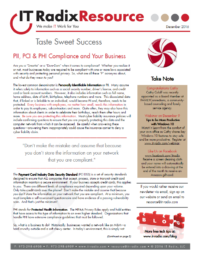
Five tips to avoid a security breach
If you’ve read this blog before, you already know security is paramount to the success of any small business. We cover the ever increasing cases


If you’ve read this blog before, you already know security is paramount to the success of any small business. We cover the ever increasing cases

Are you a “Smartie” or a “Dum-Dum” when it comes to compliance? Whether you realize it or not, most businesses today are required to be

Taste Sweet Success
In this issue:

Quick Tip: Set up email alerts on your account so you are notified any time money is withdrawn from your account. Why? Company bank accounts

Does your IT guy hold the keys to the kingdom? Such was the case with one of our latest clients and their in-house “IT guy.”

Quick Tip: Remove and destroy the hard drives Why? Getting rid of old computers or servers? Did you know that the components used in technology

The old cold-call scam is still a popular way for fraudsters to dupe people out of their money. But now they’re taking their tactics to

Cyber security is becoming more and more important in an increasingly digital age. While many people and businesses know how important their online security is,

“Sometimes you feel like a nut, sometimes you don’t.” That commercial tagline was from the 70’s and 80’s when the Hershey Company advertised two very

Quick Tip: Keep your mobile phones and apps up to date. To App or Not to App? That is the question. These days, the Internet
"*" indicates required fields